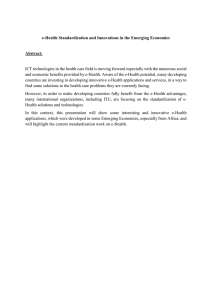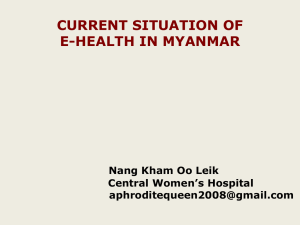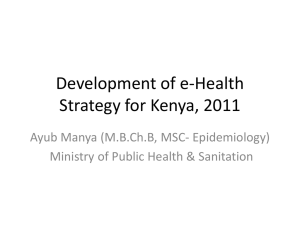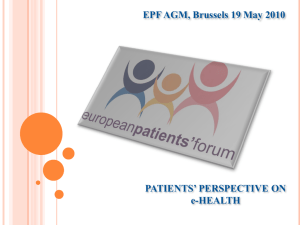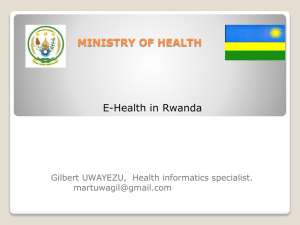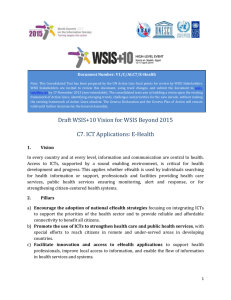Document 13472226
advertisement
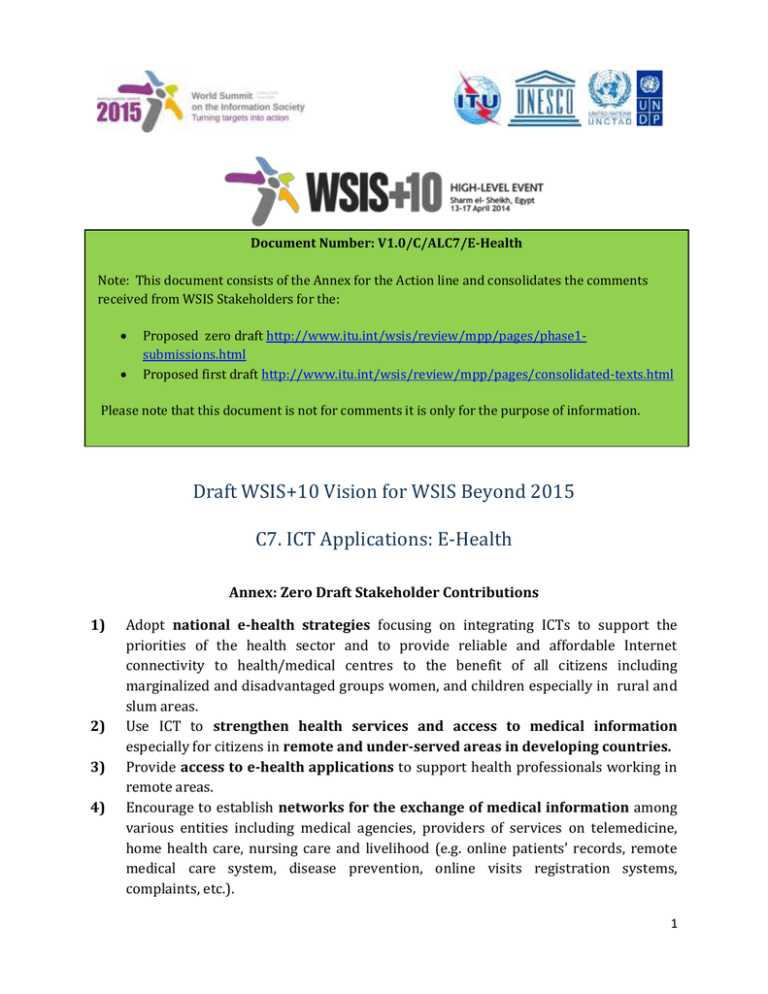
Document Number: V1.0/C/ALC7/E-Health Note: This document consists of the Annex for the Action line and consolidates the comments received from WSIS Stakeholders for the: Proposed zero draft http://www.itu.int/wsis/review/mpp/pages/phase1submissions.html Proposed first draft http://www.itu.int/wsis/review/mpp/pages/consolidated-texts.html Please note that this document is not for comments it is only for the purpose of information. Draft WSIS+10 Vision for WSIS Beyond 2015 С7. ICT Applications: E-Health Annex: Zero Draft Stakeholder Contributions 1) 2) 3) 4) Adopt national e-health strategies focusing on integrating ICTs to support the priorities of the health sector and to provide reliable and affordable Internet connectivity to health/medical centres to the benefit of all citizens including marginalized and disadvantaged groups women, and children especially in rural and slum areas. Use ICT to strengthen health services and access to medical information especially for citizens in remote and under-served areas in developing countries. Provide access to e-health applications to support health professionals working in remote areas. Encourage to establish networks for the exchange of medical information among various entities including medical agencies, providers of services on telemedicine, home health care, nursing care and livelihood (e.g. online patients’ records, remote medical care system, disease prevention, online visits registration systems, complaints, etc.). 1 5) 6) 7) 8) 9) 10) 11) 12) 13) 14) 15) 16) 17) 18) 19) 20) 21) Encourage to create systems like electronic records of drug prescription, and selfmanagement of lifestyle diseases to access and manage medical and health information by patients and individuals themselves. New technologies and services such as those that make up the “Internet of Things” and M2M Applications need to be adapted to ensure that developing countries can also benefit from them in the near future. Ease access to the world’s medical knowledge and locally-relevant content resources for strengthening public health research and prevention programs required for health experts in developing countries. Integrate the existing e-Health with e governance process. Increase and encourage the use of mobile technologies in health projects for greater reach and inclusiveness especially in developing countries. Ensure privacy protection in promoting e-health service. through well defined legislative frameworks and policies. Continue the need to ensure affordable and reliable connectivity from remote areas to health centers. Adopt national scale programs focusing on developing human capacity in e-Health. Grasp and analyze health conditions of insurance subscribers, residents and employees by insurance companies, local governments and companies through data on medical examinations and health insurance claims. Recognize the importance of legal framework to promote the use of e-Health systems. Measure the impact of e-Health, through credible and replicable evaluation mechanisms and metrics. Harmonize standards in e- health by following the international standards and enhance interoperability and networking in e-Health systems. Recognize the importance of targeting financial resources specifically for e-Health services. Seek innovative systems which connect people to information on health services, including mental health services, to improve issues of accessibility, affordability and acceptability. Seek user friendly and culturally adaptable tools to better inform about healthy lifestyles and health concerns, which help us act on that information, especially in areas of sexual and reproductive health, and in dealing with issues of disability, including knowledge to reduce problems of stigma and fear associated with many diseases. Promote preventive e- Health applications especially concerning endemic diseases. Provide widespread availability to report and receive information, through ICTs, of outbreaks, disasters, epidemics and/or other events which endanger our health. 2 22) Empower young people to develop ICT tools that improve the experience of health care while taking into account best practices and bioethics that are currently part of offline healthcare processes. 3
